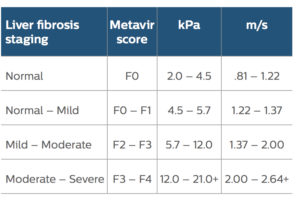Transient Elastography (FibroScan)
Non-Invasive Liver Fibrosis Assessment

FibroScan
Accurately staging liver disease is important in the determination for and monitoring of a treatment regimen. A well-studied technology has become available to complement the clinical tests that are already used, called ElastPQ (FibroScan). ElastPQ is a new non-invasive technique which uses ultrasound shear wave elastography to assess liver fibrosis and can be used, in many cases, as an alternative to liver biopsy. In addition to the avoidance of biopsies in selected individuals, it offers a benefit in that it takes a greater surface area into assessment when compared to a liver biopsy which is 1/50,000 of the liver mass. Pathologic assessment (liver biopsy) however remains the gold standard and our best direct marker. There are inherent challenges to obtaining this key piece of information which include the invasive nature of the procedure.
The following table is suggested to correlate the kPa readings generated from the ElastPQ US machine to pathologic measures of fibrosis staging (Metavir) for clinical use.

FibroScan Liver Fibrosis Staging Scale
In patients who have imaging showing significant fatty infiltration and high kPa scores measured via ElastPQ, a liver biopsy should be considered in order to define steatosis versus fibrosis and accurately stage disease.
This new technology is a huge benefit to the patients with fatty liver disease (NAFLD or NASH), hepatitis C and many other disease states. It is offered at our San Antonio and Austin clinic.






